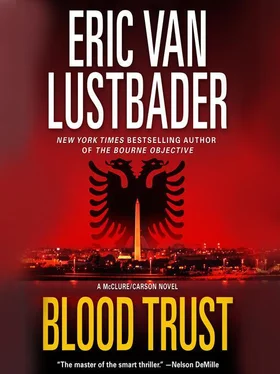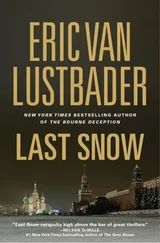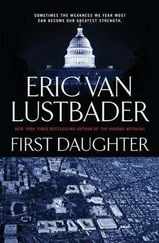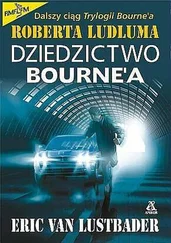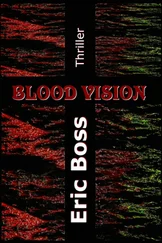Fraine was used to Heroe’s speculations. The reason he didn’t shoot them down was that more often than not they proved correct. He spread his hands. “Okay, say you’re right on all counts—”
“I know I am.” She produced a cell phone and placed it on the desk between them.
Fraine glanced at it. “Is that supposed to mean something to me?”
“This is Naomi Wilde’s cell. We found it in the center console of her car, where it was protected during the crash.”
“So?”
“Don’t you think if she were heading off to a dangerous place she’d have it with her?” She shook her head emphatically. “No, she was with someone she trusted when she was killed.”
“Someone like Peter McKinsey.” Fraine rubbed his forehead. “If you’re right—and that’s a big if —this isn’t going to go down well with the brass, not well at all.”
“Not my problem.”
“It will be if you can’t find the body. Not a word of this can be breathed to anyone until it’s found.”
“And if it’s not?”
“Then your theory never leaves this office.”
“I can’t let that happen.”
“Where is she, Nona? Where is Naomi Wilde?”
“Fuck if I know.” She made her voice into a hoarse rasp. “But wherever she is, she’s sleeping with the fishes, just like Luca Brasi. And like a Corleone I’m going to track down whoever murdered her and get my revenge.”
Fraine turned back and leaned forward with his elbows on his desk. “Revenge is a mighty disturbing word coming from a law enforcement officer.”
Heroe rose. She was like a Valkyrie—fierce, dark, determined. “Yeah, well, murdering a Secret Service agent is a mighty disturbing business.”
* * *
“WHAT DID she say just before she died?”
Arian Xhafa turned, but the Syrian appeared quite serious.
“She said, ‘Why?’”
The Syrian’s eyes went briefly out of focus. They were like pits, merciless and brutal. “That’s what they all say. You’d think someone would be more creative.”
Perhaps you will be, when you die, Xhafa thought.
“Arjeta Kraja possessed knowledge, Xhafa, and knowledge is like a virus—it can so easily spread exponentially.” The Syrian raked his fingers through his beard, a sign that he was lost in thought. “Did she say anything else?”
“Yes.” Xhafa shivered. He had hoped the Syrian wouldn’t ask. “She said, ‘Where I’m going, there are no more secrets.’”
The Syrian started as if he’d been stuck with a hypodermic. “I knew the moment she ran,” he said, “and now here’s the proof of it. You see, you fool. She did know.”
Once again Xhafa felt like a child being reprimanded for his ignorance. Suddenly, he was possessed by a murderous rage, and he spent the next thirty seconds consciously uncurling his fingers, keeping them from becoming fists. Ever since the Syrian had brought up Arjeta Kraja, Xhafa had felt a cold lump forming in the pit of his stomach. The orphan student body at the Tetovo school was larded with girls—recruits to slavery his agents had stolen or bought from their desperate or unscrupulous families. One of those was Arjeta’s sister, Edon. Did she know what her sister knew, had her sister spoken to her before Xhafa had had a chance to silence Arjeta? He didn’t know. Come to that, he didn’t know whether Edon Kraja had survived the attack on the school. He prayed to Allah that she hadn’t. In either case, he dared not say a word about Edon to the Syrian. If he did, he knew it would be the end for him.
Oblivious to Xhafa’s mounting tension, the Syrian gazed out the smoked window, deeply immersed in his own thoughts. The caravan pulled into a huge estate, passed through an electronically controlled gate in a high fence topped with rolls of electrified razor wire, and now rolled along a drive of crushed marble so white that even in the gloom it sparkled. Men holding huge attack dogs on leashes appeared on either side of the house. The dogs strained at their leashes, their eyes golden and greedy.
The Syrian ignored them. “She saw and she must have heard someone mention the name.”
“But who would mention the name?” Xhafa said.
The armored vehicle came to rest precisely in front of an immense oak door, snatched from a looted medieval cathedral, that rose, as if on a plinth, at the top of six wide white stone steps.
The two men emerged from the vehicle. The attack dogs’ flanks quivered but they remained stationary; the scents of the two men were known to them.
The door was opened by Taroq, the compound’s chief guard. They exchanged greetings as he ushered them into a space as large as a football field and as spare as a monk’s cell. There was no furniture to speak of, only a number of silk prayer rugs, large cushions, and one low wooden table on which sat a tall teapot with a long S-shaped spout, six small glasses in brass frames, and an antique hookah. The two men removed their shoes on the doorstep and stepped into soft leather slippers with turned-up toes.
Light flooded the space from a series of windows on either side wall. Against the rear wall, a good distance away, was a simple desk and chair. On the desk were three computers—two desktops and a powerful but thin laptop. All were hooked into a high-speed modem with which the house had been specially provided, according to the specifications of the person sitting at the desk, peering from one screen to another.
“Hello, boys,” the figure said in a darkly sweet contralto. She spoke in English. “Back already?”
The chair swiveled around as the whisper of the men’s slippers approached. A young woman sat in the chair. She was thin as a reed with a pale, ascetic face whose main feature was a broad, high forehead. Her blond hair was pulled back in a neat ponytail that came to rest between her knife-thin shoulder blades. She wore a pair of black jeans and a man-tailored shirt of the same color with the sleeves rolled up to the elbow, revealing silken hair that was almost white. She wore no makeup or jewelry, but her deep-set emerald eyes glittered with a fierce and almost feral intelligence.
Then she stood and came toward them in long, athletic strides. She was tall, but not nearly as tall as the Syrian. She had to arch upward, standing on tiptoe, to kiss him on the lips, a long, lingering kiss whose naked passion forced Xhafa to look away.
The Syrian’s face broke into a smile of what might, for him, be termed bliss.
“Caroline, my habibi, ” he said. “What terrible mischief have you been up to while I’ve been absent?”
TWENTY-THREE
THREE SIGNIFICANT things happened in the aftermath of the destruction of Arian Xhafa’s stronghold in Tetovo. First, Alli discovered that not all the students were orphans. Most of the young girls, in fact, either had been kidnapped or sold into slavery. Second, there was cell phone service in the area. As Jack’s cell buzzed to life, locking onto the signal, he saw Paull listening intently as Alli spoke with the children’s spokesperson, a beautiful girl with the most perfect skin he’d ever seen, whom Alli seemed to have bonded with immediately.
There were three messages from Naomi Wilde. Figuring that she had been trying to get in touch with him in order to update him on her progress, he listened with a sense of both shock and mounting alarm to the brief but succinct reports on her theories.
In the first, she spoke of her mounting suspicions concerning her partner, Peter McKinsey, and his possible connection with Fortress Securities. She also told him about the conflicting evidence against Alli, as if two opposing forces were at work countering each other, an occurrence that, frankly, had her baffled.
In the second message, she described her tailing McKinsey into Georgetown and the marina there along the Sequoia boardwalk. McKinsey had met an unknown man who, by Naomi’s detailed description, seemed most certainly an Arab of some sort. The Arab had driven McKinsey out to Theodore Roosevelt Island, where they had disembarked and vanished into the foliage. Naomi didn’t say how long they were on the island. Possibly, she hadn’t stuck around to find out.
Читать дальше
